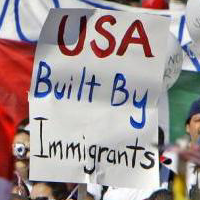U.S. Tech Startups Could Grow Under New Homeland Security Proposal Welcoming Foreign Entrepreneurs
 (photo: aetcnmc)
(photo: aetcnmc)
By Stacy Cowley, New York Times
Foreign entrepreneurs building new companies in the United States could soon gain a new immigration option that would grant them temporary entry for up to five years, under a rule (pdf) proposed Friday by the Department of Homeland Security.
The proposal, which does not require congressional approval, would allow immigration officials to admit entrepreneurs case by case. To qualify, an applicant must have an “active and central role,” and a significant ownership stake, in a U.S. company founded in the last three years.
The move is one of many piecemeal efforts by the Obama administration to expand American immigration policies without action from Congress. Entrepreneurs in any industry would be eligible to apply, but the new rule would be especially significant for the technology field. Creating an immigration route for startup founders has been one of Silicon Valley’s political priorities.
“This is a big step in the right direction,” said Patrick Collison, an Irish immigrant and the chief executive of Stripe, a payment processing company based in San Francisco. “I think it will have major impact on U.S. entrepreneurship, and potentially on the broader economy.”
More than half of American tech startups valued at $1 billion or more had at least one immigrant founder, according to a recent study (pdf) by the National Foundation for American Policy, a research group that focuses on immigration issues.
Collison and his brother John started Stripe five years ago while attending colleges in Massachusetts. Dealing with the brothers’ visa issues was one of the biggest challenges Stripe had to overcome in its early days, Collison said. The company now has more than 500 employees, and Collison is part of a group of Silicon Valley executives and investors pressing for immigration reform.
President Barack Obama made it a signature policy issue, speaking frequently about the need for a path that would allow skilled entrepreneurs to build new companies and create jobs, but efforts to create a “startup visa” for foreign entrepreneurs have repeatedly died in Congress.
In 2014, Obama changed tactics, using an executive action to order federal officials to draft a plan for granting some entrepreneurs temporary immigration status.
The proposal put forth on Friday circumvents visas by relying on a federal law that lets the secretary of homeland security temporarily admit people whose entry into the United States would create “significant public benefit.” Around 3,000 entrepreneurs a year may qualify, according to an estimate from the Department of Homeland Security.
Sophie Alcorn, an immigration lawyer in Mountain View, California, said the new rule, if adopted, could significantly ease the challenges faced by fledgling entrepreneurs, especially those who came to the United States to attend college and began working on a new venture.
“I get calls every day from desperate startup founders who are brilliant and accomplished, but they get into this chicken-and-egg problem,” she said. “Investors won’t give them money unless they can be confident that people can get into the country, or remain here.”
Immigration has become a major flash point in this year’s presidential race, with the Republican nominee, Donald Trump, calling for stricter limits on entry and his Democratic opponent, Hillary Clinton, proposing automatic green cards for foreign students who earn advanced degrees in technical fields from U.S. universities.
Deepak Kamra, a venture capitalist, testified before Congress three years ago in favor of a visa for entrepreneurs. The idea had broad bipartisan backing, he said, but kept falling apart over the issue’s politics.
“Establishment Republicans and Democrats all support this, but they all then back up and say, ‘It should be part of comprehensive immigration reform,’ which is code for, ‘It’s not going anywhere,'” Kamra said.
The main immigration pathway for foreign workers with specialized skills, the H-1B visa program, has been plagued by controversy and abuses, and labor groups generally oppose efforts to expand it. But past proposals to create pathways for entrepreneurs have drawn fairly little criticism, in part because the suggested programs are typically small and targeted.
The Department of Homeland Security’s 155-page proposal will be open for public comment for 45 days. After that, the department can move forward with a final rule, which could take effect as soon as next year.
To Learn More:
International Entrepreneur Rule (Department of Homeland Security) (pdf)
Program to Import “Needed” Tech Workers Displaces 400 Laid-Off SoCal Edison Workers (by Ken Broder, AllGov California)
Immigrants Twice as Likely to Start Small Businesses as Native-Born (by Noel Brinkerhoff, AllGov)
California Has Most Immigrant Entrepreneurs, and Room for More Offshore (by Ken Broder, AllGov California)
- Top Stories
- Unusual News
- Where is the Money Going?
- Controversies
- U.S. and the World
- Appointments and Resignations
- Latest News
- Trump Renames National Football League National Trump League
- Trump to Stop Deportations If…
- Trump Denounces World Series
- What If China Invaded the United States?
- Donald Trump Has a Mental Health Problem and It Has a Name






Comments